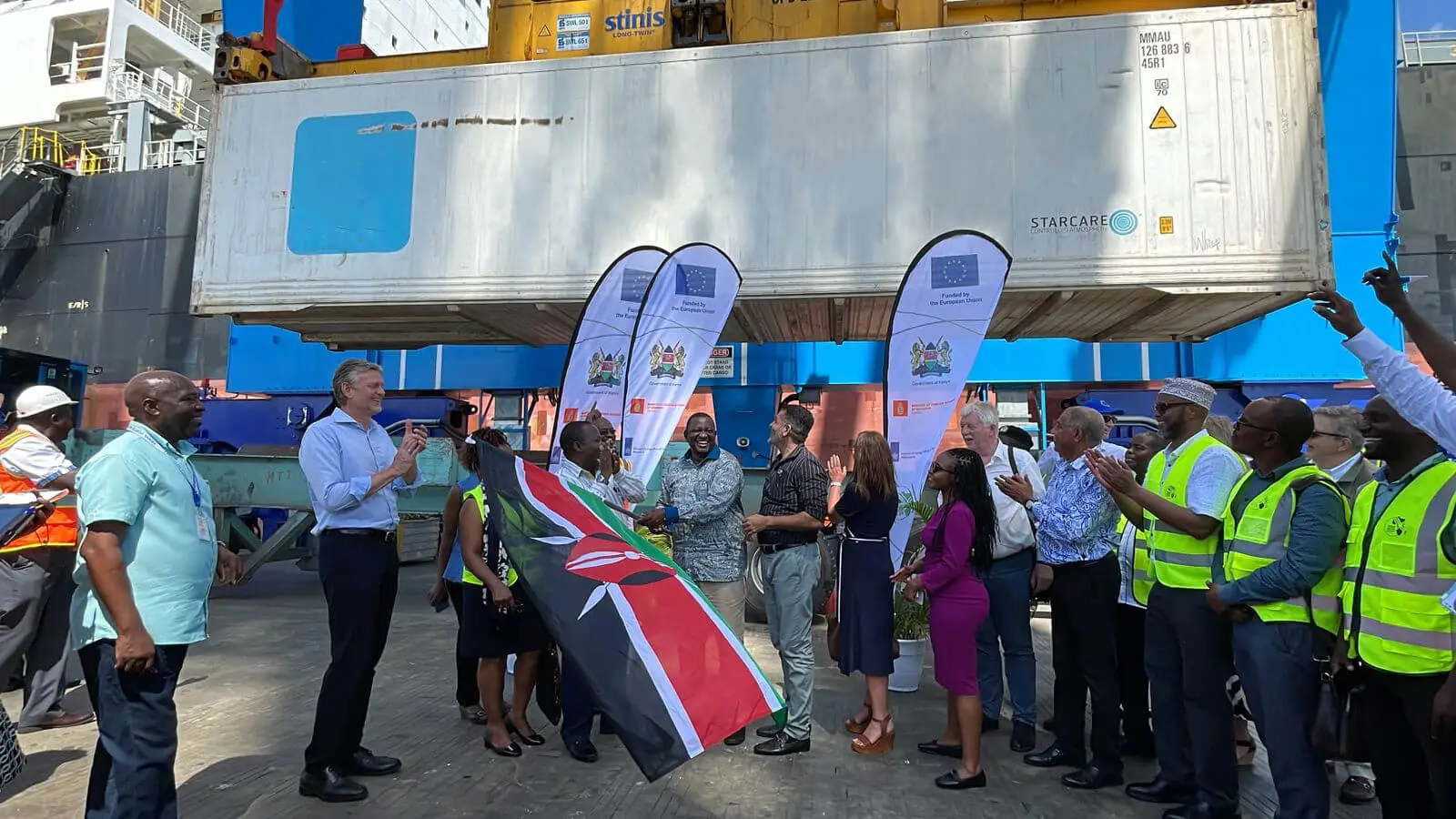Mombasa, 17 May 2023: Under the leadership of the Netherlands, supported by Denmark and the European Union (EU), TradeMark Africa (TMA) with the Kenyan Government and private sector, have today kicked off plans aimed at driving the country’s shift to the green and sustainable transportation of Kenyan horticultural exports. Successful implementation of the plans will enable Kenya to not only increase its share, but also to shift to exporting half of its horticulture produce from air to sea freight in the next 10 years. This will reduce both the carbon footprint and the cost of exports. Several larger companies have already started to use sea freight for the export of flowers, vegetables and fruits but the sector is now aiming for a transformative and larger shift.
The kick off meeting at the Port of Mombasa marked the official start of engagements to map out pathways towards transitioning to moving more horticultural exports by sea. It was attended by Kenya’s Cabinet Secretary for Mining, Blue Economy and Maritime Affairs Hon. Salim Mvurya, representatives from the Ministry of Roads and Transport, Ambassadors from European Union Member States in Kenya and TMA Country Director Mr Ahmed Farah and Deputy CEO Ms Allen Sophia Asiimwe.
Those attending the meeting agreed that the shift from air to sea freight will allay growing concerns about air freight’s large carbon footprint. The push for sustainable transportation comes not just from the EU, which is one of Kenya’s major export destinations, but also other major global actors and industry players. Consumers especially in Europe, are on the frontline of this push for a radical decarbonisation of value chains that deliver fresh produce to their supermarket shelves and dining tables.
“The transition from air freight to sea freight will have to go hand in hand with the private sector. It is important to create export volumes, optimize systems and foster innovations in port development. Therefore, I am very happy to have attended the first public private working group meeting to facilitate the shift from air freight to sea freight,” said the Ambassador for the Kingdom of the Netherlands to Kenya, Mr. Maarten Brouwer. The Netherlands also announced a trade mission to Mombasa and its Port in September 2023.
In his remarks the Denmark’s Ambassador to Kenya, Mr. Ole Thonke thanked the Netherlands and EU Ambassadors and the representatives of the Government of Kenya for taking the lead in providing support to Kenya’s green transformation of its export of horticultural product.
“It will be good both for Kenya and for importing countries like Denmark. We look very much forward to active participation first in the mapping of the opportunities, engaging the private sector in Kenya as well as in Denmark and later to contributing to the implementation of the transformation,” said the Ambassador.
Speaking on behalf of the European Union, Ambassador Henriette Geiger said, “The sector is ripe for an urgent and radical transition from air to sea freight, more than ever as a step in the right direction in the clamour for climate change action. Our support is directly related to the EU Green Deal which aims, among other things, to make the economy and trade more sustainable and part of the EU Global Gateway. A more sustainable export of Kenya’s horticulture goods is essential to ensure the growth of the sector in the future and all jobs and livelihoods that depend on it.”
The support from the EU is part of the Business Environment and Export Enhancement Programme BEEEP), a five year Ksh 3.8 billion programme implemented by TradeMark Africa. The programme’s overall goal is to enhance the competitiveness and raise the share of exports of Kenyan avocados, mangoes, and vegetables to Europe and other international markets. Part of the implementation initiatives will focus on resolving production, storage, logistics, value addition challenges that the horticultural sector faces. Other planned interventions include improving efficiency and environmental sustainability of transport infrastructure to reduce trade costs and time, modernising and harmonising trade processes and procedures, improving access to quality standards and phyto-sanitary measures, streamlining trade agreements, and supporting the implementation of the necessary business reforms.
TradeMark Africa Deputy CEO, Ms Allen Sophia Asiimwe, emphasised the organisation’s commitment to convene public and private sector players to implement transformative programmes: “Sea freight is viable and a win-win option for all as Kenya gears to increase its volume of exports by 50% by year 2030. It is a more sustainable alternative, less expensive and has an enormous carrying capacity. As TradeMark Africa, we are working closely with our development partners and private sector players to establish digital corridors to enhance market access, increase transparency and traceability of Kenya’s horticultural produce in the destination markets,” she said.
Horticulture is one of the leading export earners for Kenya and generated Ksh 152.3 billion in earnings in 2022 compared to Ksh 165.6 billion in 2021, according to the Kenya National Bureau of Statistics. The decline in the horticultural exports was partly attributed to high inflation in the European Union, the primary destination for cut flowers, fruits, and vegetables.
Historically, air freight has been regarded as a faster and more reliable alternative in the shipment of goods. However, it is more expensive, detrimental to the environment and transports much less in volumes and value compared to sea freight. Studies show that air freight constitutes about 2.5% of global carbon emissions, despite ferrying just 1% of total global cargo. In contrast, sea freight produces about 2.9% of carbon emissions and accounts for over 80% of global trade by volume and 70% by value. This makes it a much more sustainable and environmentally friendly alternative in the race for decarbonisation.


